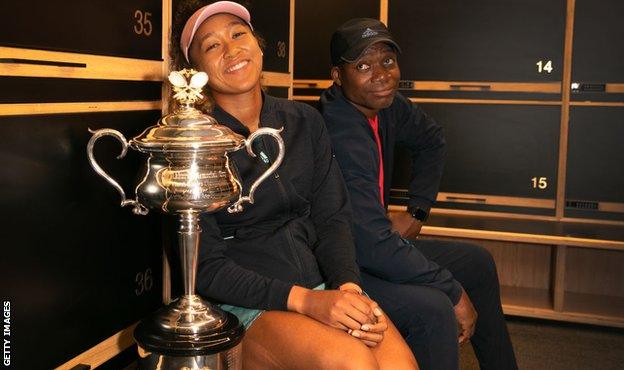Naomi Osaka: Australian Open champion 'has the world at her feet'
- Published
- comments
Osaka beats Kvitova in thrilling final
In September, as bad blood spilled on to the Louis Armstrong Stadium Court in New York, Naomi Osaka shut out the enveloping acrimony and earned herself a maiden Grand Slam title.
Four months later here in Melbourne - on the other side of her 21st birthday - the Japanese star once more showed enormous resilience, willpower and nerve to win again at the next opportunity.
This time there was no Serena Williams, and the umpire was returned to a supporting role. But many still would have faltered after seeing three championship points saved, and being dragged into a deciding set in the Australian Open final.
"I'm not sure if it's feeling grown up, or being able to dissociate my feelings," Osaka said after Saturday's 7-6 (7-2) 5-7 6-4 victory over Czech Petra Kvitova.
"You know how some people get worked up about things? That's a very human thing to do. Sometimes I feel like I don't want to waste my energy doing stuff like that.
"In the third set of my match today, I literally just tried to turn off all my feelings. I just felt kind of hollow, like I was a robot.
"I was just executing my orders - I just did what I've been practising my whole life in a way."
Those words could have a sinister ring if delivered from the wrong mouth. But in the sporting realm, players crave the ability to cut themselves off emotionally when the prize is on the line - to be able to recall their lines with clarity and authority.
Osaka had been the stronger player before Kvitova's dramatic counter-attack in the second set, and she proved the stronger player afterwards, too.
In next to no time, she has developed the knack of winning when it matters most.
In Indian Wells in March last year, Osaka won her first tour title - beating Maria Sharapova, Agnieszka Radwanska, Karolina Pliskova and Simona Halep en route to the final. There is no bigger event on the WTA Tour, and her subsequent titles have come at Grand Slam level.

Naomi Osaka won many fans with what she called the "worst acceptance speech of all time" after her Indian Wells victory
This time last year, as Osaka sat at number 72 in the world, we knew she had the potential to become a multiple Grand Slam champion. But no-one could have predicted the speed with which success has come.
Increased scrutiny and expectations have, at times, halted the progress of exceptional players. Osaka, an instinctively shy woman who is uncomfortable with direct eye contact, thinks she used to receive more media attention than her ranking deserved.
But, as she now acknowledges, that early exposure has done her no harm at all.
Osaka is an exceptional frontrunner. In 60 matches, dating back to 2016, she has been victorious every time she has won the first set. And with the help of coach Sascha Bajin, Osaka has been able to add nuance to her explosive power.
"From the very beginning, she was a big hitter," Bajin recalled on the eve of the final in Melbourne.
"I didn't have to teach her how to hit the ball or anything. Maybe it was a little bit more like telling her there are other things out there than just hitting very hard.
"We worked on her angles. We worked on just a little bit more of everything - slicing, I wanted her to come in a little bit more."
The partnership got off to an inauspicious start when Bajin injured his ankle in their first training session together at the end of 2017.
But their respect and affection for each other is now very clear. Bajin has been happy to confess he wrongly used to think of her as a "diva" because she kept her head down when he walked past.
And Osaka said she did not think the German would make much of a coach because, in the past, he had been primarily employed as a hitting partner.
Osaka describes her father as her "mental pillar" - a super positive presence who does not enjoy watching her matches but will spring up after a win, vigorously pumping his fists. And if she is feeling down, he can be relied on to do "something silly" to cheer her up.

Naomi Osaka posed with her father for trophy photos in the locker room in Melbourne
Osaka appears to have the world at her feet. It seems likely she will win many more Grand Slams, although no-one knows what surprises life has in store.
Victoria Azarenka's second, and most recent, major triumph came in Australia when she was 23. The Belarusian has since had the blessing of a child but the curse of injury and an even more painful custody dispute.
Osaka is the youngest world number one since Caroline Wozniacki of Denmark reached the top in 2010. And she is happy to outline ambitious plans for the future - albeit in her typically understated way.
"I'm going to have to play Indian Wells again. Of course, I'd love to win that again and then play Miami and hopefully win that," she said.
"People who can win Indian Wells and Miami back to back, it's usually the best players in the world. That would be my next goal.
"Yeah, I feel like I'm going with the flow. That's sort of been my motto my whole life ...."